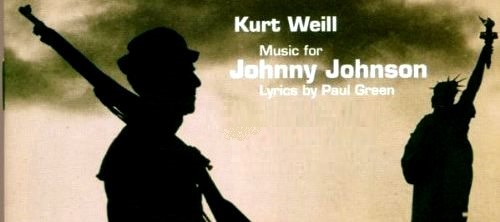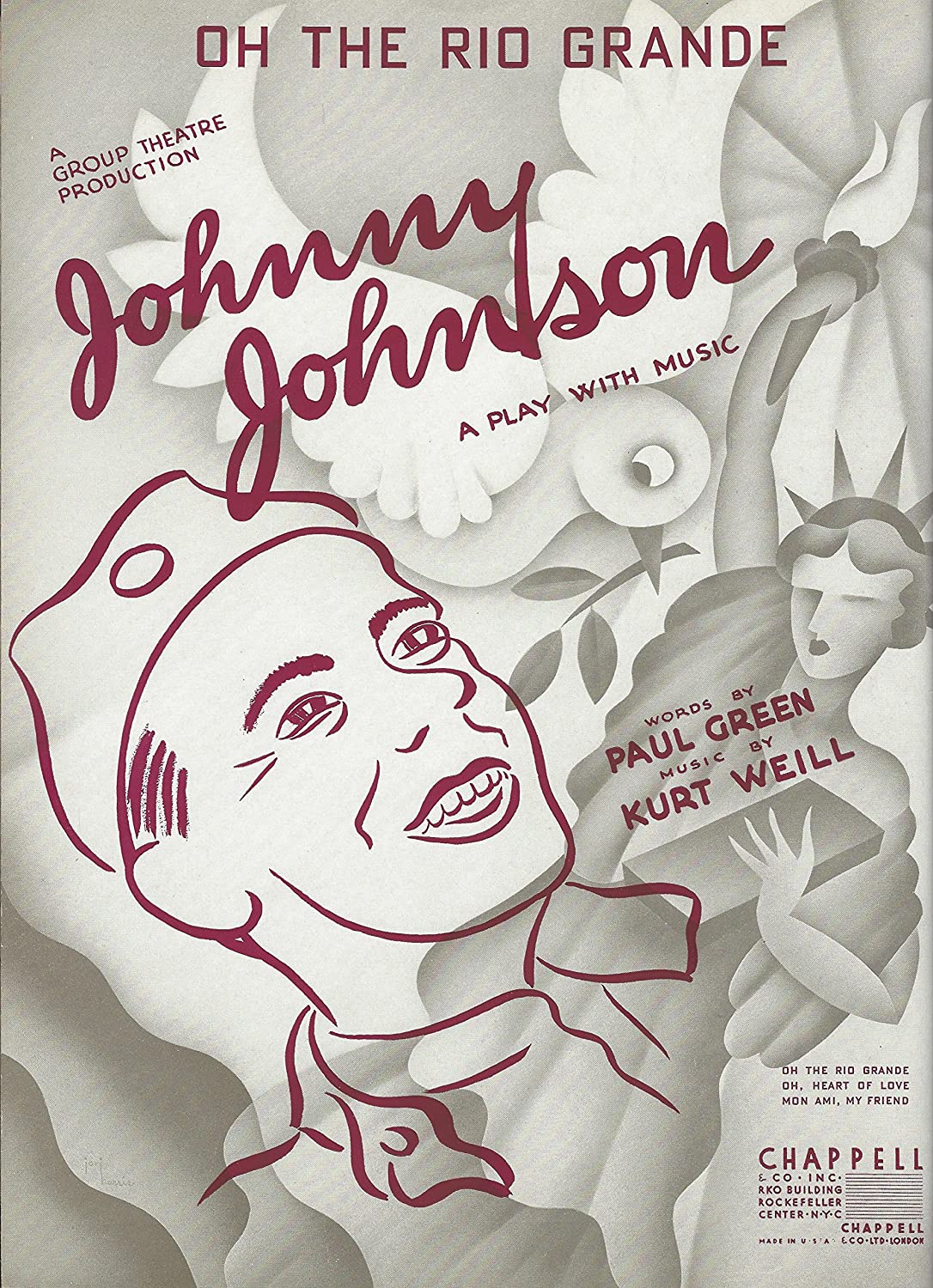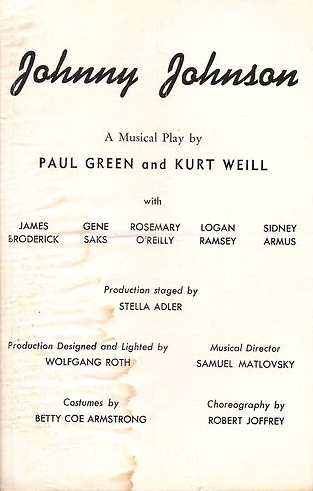
La diatribe contre la guerre Johnny Johnson est la première partition écrite directement pour Broadway par Kurt Weill (Die Dreigroschenoper - The Threepenny Opera - L'Opéra de quat'sous ()) avait été créée en Allemagne en 1928). La pièce de Paul Green avec la musique de Kurt Weill était tout sauf traditionnelle. Elle a proposé une variété de méthodes pour incorporer la musique dans une intrigue un peu picaresque parsemée de techniques de mise en scène expressionnistes et brechtiennes. Il y avait des numéros de comédie musicale à l’ancienne, des chansons avec de brèves bribes de paroles, des séquences orchestrales qui fonctionnaient comme de la musique de fond et des numéros interprétés par des chanteurs hors scène. Le personnage-titre (joué par Russell Collins) chantait à peine, tandis que d’autres avaient une chanson avant de disparaître de l’histoire!
Johnny Johnson est un jeune Américain naïf et innocent qui se retrouve à combattre la guerre pour mettre fin à toutes les guerres sur les champs de bataille de l’Europe pendant la Première Guerre mondiale. Quand le jeune pacifiste pulvérise des gaz hilarants sur les hauts fonctionnaires militaires, Il est enfermé dans un asile de fous où lui et d’autres fantasment qu’ils sont des représentants de la SDN (Société des Nations – une sorte d'ONU de l'époque). Johnny est finalement libéré et rentre chez lui où il fabrique des jouets non agressifs pour enfants. Et pendant ce temps, le monde se prépare pour la prochaine guerre.
Acte I
It is April 6, 1917, in a small-town square somewhere in middle America. The villagers gather to unveil a monument carved by the local stonecutter, Johnny Johnson. The Mayor reminds them that President Woodrow Wilson has declared America must stay out of foreign wars (Over in Europe). Minny Belle Tompkins, Johnny's sweetheart, reads an original poem in honor of peace (Democracy's Call), though her Grandpa Joe recalls his Civil War combat with unseemly relish ( Up Chickamauga Hill). Then a messenger delivers President Wilson's declaration of war. The whole town, except Johnny, is instantly inflamed with a mindless martial spirit. Even weakling Anguish Howington, Johnny's rival for Minny Belle's affections, vows he will enlist. Johnny finally unveils his monument after everyone exits; it is a dove ( Johnny's Song).
A few days later, Aggie, Minny Belle's widowed mother, discusses Johnny with Grandpa Joe as she sews ( Aggie's Song). Johnny gives a locket with his picture to Minny Belle, who receives it rapturously ("Oh, Heart of Love"), then steels herself against his departure ( Farewell, Goodbye). When Johnny tells her he's not sure he wants to go to war, Minny Belle breaks their engagement, and Johnny decides to join up after all ( The Sergeant's Chant). At the recruiting station, Captain Valentine reads a movie magazine ( Captain Valentine's Song) while Anguish takes his physical. After he is rejected, Valentine and his staff examine Johnny. His unorthodox replies cause him to flunk the intelligence test, and two hulking privates throw him out. But when Johnny knocks one of them flat with a single punch, Captain Valentine inducts him after all. Not long afterwards, hundreds of new soldiers sail past the Statue of Liberty, bound for Europe. Johnny addresses the statue, hailing the ideals she represents. As he falls asleep, she replies, explaining that she is merely an inanimate symbol, misused to send young men off to die ( Song of the Goddess).
As the newly arrived American soldiers walk toward the front lines, a cortege of lame and blind French soldiers stumble away ( Song of the Wounded Frenchmen). The new soldiers settle into the trenches, and Johnny brings tea and food ( The Tea Song). At nightfall, one homesick soldier sings of Texas ( Oh, the Rio Grande), and Johnny dreams of Minny Belle. Three cannon muzzles take center stage and sing to the sleeping soldiers, saying that they are only metal that might have been put to better use ( Song of the Guns).
Johnny sets out at dawn to find a pesky German sniper and captures him ( Music of the Stricken Redeemer). Since the young man speaks English, Johnny encourages him to stoke resistance to the war among the rank and file and sends him back to enemy lines. Captain Valentine appears and tries to gun down the sniper over Johnny's objections. When the Germans return fire, Johnny is shot in the buttocks.
Acte II
A flirtatious French nurse tends to Johnny in the hospital ( Mon Ami, My Friend). A doctor enters with a canister of laughing gas, but he loses track of it when a dignitary enters. Still hoping to stop the war, Johnny waits until everyone leaves and sneaks out with the canister. Later the same night the Allied commanders convene in a splendid chateau. The generals plan strategy, casually discussing the thousands of lives that will be lost ( The Allied High Command). Suddenly Johnny appears and announces that the German soldiers are ready to give up. As the generals try to seize him, Johnny releases the laughing gas. The commanders collapse in hilarity ( The Laughing Generals) and send Johnny back to the front lines with an order ending the war, but they revoke it the instant the gas wears off.
Johnny rushes to the battlefield and proclaims the end of hostilities. Despite the joyful reaction from both sides, two American officers accuse Johnny of spying and order the battle to be rejoined. Over renewed shellbursts, an American and a German chaplain simultaneously intone prayers ( In Times of War and Tumult). When the smoke clears, Johnny is arrested, returned to America, and committed to a mental hospital. The chief psychiatrist, Dr. Mahodan, tells Minny Belle that Johnny must remain indefinitely. Dr. Mahodan goes on to explain (none too convincingly) that modern psychiatry is an improvement on witchcraft ( The Psychiatry Song).
Ten years pass. A group of patients has formed a debating society in which each inmate resembles a well-known American statesman ( Asylum Chorus). They vote for a Wilsonian "League of World Republics," and Dr. Frewd -another patient - leads them in the Hymn to Peace. The hospital directors, accompanied by Anguish (now a benefactor), enter the room on an inspection tour. The directors tell him that Johnny is soon to be released. Anguish coldly informs Johnny that he married Minny Belle years earlier.
In the final scene, a prematurely aged Johnny stands on a street corner hawking handmade toys while a war rally goes on in a nearby stadium. He continues his cries of "Toys! Toys!" as the roar from the stadium grows louder. Johnny lifts his voice in a song of hope against the cruelty and dishonesty all around him ( Johnny's Song).
D’après le roman satirique de Jaroslav Hašek The Good Soldier Švejk.
Dans la Première Guerre mondiale, «Johnny Johnson» est le nom qui a le plus souvent figuré sur les listes des victimes aux États-Unis. Johnny Johnson semblait par conséquent être le titre logique du musical pacifiste de Paul Green et Kurt Weill (son premier musical américain).
Weill avait fui l’Allemagne nazie au plus fort de sa gloire, presque exclusivement due à une seule œuvre: son Opéra de quat'sous () écrit avec Bertolt Brecht. Weill se rendit à New York pour composer la partition de The Eternal Road, un vaste spectacle dépeignant l’histoire des Juifs. Mais quand ce projet a pris du retard, il a reçu une invitation d’une source improbable: le The Group Theatre, une cellule de disciples de Stanislavski, positionnée politiquement très à gauche, qui consacrait son travail au drame avec signification sociale dans la tradition du Théâtre d’Art de Moscou. Le The Group Theatre a existé de 1931 à 1941. Les facteurs principaux de ce groupe furent la guerre imminente, l'attrait de la gloire et de la fortune à Hollywood, le manque de financement institutionnel et les frictions interpersonnelles. Il inspirera fortemment l'Actors Studio d'après-guerre.
En guise de modèle pour leur projet de musical, Green et Weill se sont penchés sur le grand roman satirique de Jaroslav Hasek Le bon soldat Schweik, mais l’accouchement de leur bébé au sein du The Theatre Group a été très complexe et entraîné des douleurs majeures.
Johnny Johnson a finalement ouvert au 44e Street Theatre le 19 novembre 1936 proclamant haut et fort les ambitions belliqueuses d'Hitler alors que ce dernier était presque déjà depuis quatre ans au pouvoir. Le musical ne s'est joué que 68 représentations. La distribution comprenait Russell Collins (Johnny) et Phoebe Brand (Minny Belle), mais aussi Luther Adler, Morris Carnovsky, Lee J. Cobb, Curt Conway, John Garfield, Elia Kazan, Robert Lewis et Sandy Meisner dans les rôles de soutien.
Une production de 1956 est présentée Off-Broadway au Little Carnegie Playhouse du Carnegie Hall. Il a été mis en scène par Stella Adler avec entre autres James Broderick (Johnny Johnson) et Gene Saks dans le role du psychiatre fou. Le musical s'est joué du 21 au 28 octobre 1956.
En 1971, un revival est produit à Broadway à l'Edison Theatre. Après dix avant-premières, il fermera le soir même de la première, le 11 avril 1971. Ce revival était mis en scène par José Quintero et chorégraphié par Bertram Ross. La distribution comprenait Ralph Williams (Johnny) et Alice Cannon (Minny Belle).
La pièce a été mise en scène par la Royal Shakespeare Company du 6 au 15 août 1986 à l'Almeida Theatre à Londres dans une mise en scène de Paul Marcus. Le casting était composé de Clive Mantle, Tina Marian, Michael McNally, Keith Osborn, Juliet Stevenson, Graham Turner et Andrew Yeats.
Acte I
Opening (Bela Lublov, Gypsy Band)
“Bucharest” (Lillion Clark, Daniel Harris)
“Lady in the Window” (Lillion Clark, Daniel Harris, Gypsy Band)
“Just Hello” (Carl Brisson, Lillion Clark, Daniel Harris, Gypsy Singers, Gypsy Band)
“Moonlight and Violins” (Ruth Weston, Carl Brisson)
“Lady in the Window” (reprise) (Carl Randall, Ensemble, Gypsy Band)
“Two Ladies and a Man” (Ruby Mercer, Ensemble, Gypsy Band)
“You Are All I’ve Wanted” (Carl Brisson)
“Waltz Fantasie” (Nitza Vernille, Carl Brisson)
“Waltz Fantasie” (reprise) (Carl Brisson)
“How Could a Fellow Want More” (June Havoc, Jack Sheehan)
“No Use Pretending” (Ruby Mercer, Carl Brisson)
“Hear the Gypsies Playing”(Ruby Mercer, Gypsy Band)
“Just Hello” (reprise) (Carl Brisson)
Fi- nale Act One (Ruby Mercer, Carl Brisson)
Acte II
“Shadows” (Lillion Clark)
“When a Girl Forgets to Scream” (Carl Brisson)
“Blame It All on the Night” (Ruby Mercer, Carl Brisson)
“Moonlight and Violins” (reprise) (Ruby Mercer, Carl Brisson)
“You Are All I’ve Wanted” (reprise) (Carl Brisson)
“No Use Pretending” (reprise) (Ruby Mercer, Lillion Clark)
Dance (Carl Brisson, Helen Gray)
Finale Act Two (Company)
Aucun dossier informatif complémentaire concernant Johnny Johnson
Aucun dossier informatif complémentaire concernant Johnny Johnson

Version 1
Johnny Johnson (1936-11-44th Street Theatre-Broadway)
Type de série: OriginalThéâtre: 44th Street Theatre (Broadway - Etats-Unis) Durée : 1 mois 4 semaines Nombre : 68 représentationsPremière Preview : 19 November 1936
Première: 19 November 1936
Dernière: 16 January 1937Mise en scène : Lee Strasberg • Chorégraphie : Producteur : Star(s) : Avec: Bob Lewis (The Mayor, French Premier), Tony Kraber (The Editor, Private Harwood, Brother Theodore), Phoebe Brand (Minny Belle Tompkins), Roman Bohnen (Grandpa Joe, American Commander-in-Chief, Brother Claude), Will Lee (A Photographer, Private Goldberger), Curt Conway (A Boy, Private Patrick O’Day, Brother William), Russell Collins (Johnny Johnson), Grover Burgess (Anguish Howington), Susanna Senior (Aggie Tompkins), Sanford Meisner (Captain Valentine), Lee J. Cobb (Doctor McBray, A French Major-General, Brother George), Art Smith (Sergeant Jackson, A Doctor, Brother Thomas), Eunice Stoddard (A Camp Doll), Albert Van Dekker (later known as Albert Dekker) (Corporal George, Brother Hiram), William Challee (Private Fairfax, A Doctor), Elia Kazan (Private Kearns, Doctor Frewd), Herbert Ratner (Private Svenson, Military Policeman, An Attendant), Joseph Pevney (A West Point Lieutenant), Luther Adler (An English Sergeant, Belgian Major-General, Brother Henry), Judson Hall (A British Soldier), Jules (later, John) Garfield (Johann Lang), Paula Miller (A French Nurse), Paul Mann (An Orderly, German Priest), Ruth Nelson (A Sister from the O.D.S.D.L.D.), Morris Carnovsky (Chief of the Allied High Command. Doctor Mahodan), Orrin Jennings (His Majesty the King), John Most (British Commander-in-Chief), Thomas C. Kennedy (Scottish Colonel), Jack Saltzman (A Liaison Officer), Alfred Saxe (American Priest), Kate Allen (Doctor Mahodan’s Secretary), Robert Joseph (Brother Jim), Eddie Ryan Jr. (An Attendant), Peter Ainsley (Soldier), James Blake (Soldier), Judson Hall (Soldier)

Version 2
Johnny Johnson (1956-10-Carnegie Hall Playhouse-New York)
Type de série: RevivalThéâtre: Carnegie Hall Playhouse (New-York - Etats-Unis) Durée : 1 semaine Nombre : Première Preview : 21 October 1956
Première: 21 October 1956
Dernière: 28 October 1956Mise en scène : Stella Adler • Chorégraphie : Robert Joffrey • Producteur : Star(s) : Avec: Rosemary O'Reilly (Minny Belle Tompkins), Maurice Edwards (Grandpa Joe), James Broderick (Johnny Johnson), Logan Ramsey (Captain Valentine), Charles Tyner (Dr. McBray), Robert Minford (An English Sergeant), Edward Printz (Johann Lang), Elizabeth Parrish (A French Nurse), Gene Saks (Dr. Mahodan), Sidney Armus (His Honor)

Version 3
Johnny Johnson (1971-04-Edison Theatre-Broadway)
Type de série: RecréationThéâtre: Edison Theatre (Broadway - Etats-Unis)
Durée : Nombre : 10 previews - 1 représentationsPremière Preview : 01 April 1971
Première: 11 April 1971
Dernière: 11 July 1971Mise en scène : José Quintero • Chorégraphie : Bertram Ross • Producteur : Star(s) : Avec: Ralph Williams (Johnny Johnson), Alice Cannor (Minny Belle Tompkins), Paul Michael (Mayor/Pvt. Fairfax/Amer. Cmdr./Brother Thomas), June Helmen (Miz Smith/French Nurse), Bob Lydiard (Photographer/Sniper), Christopher Klein (Messenger/Howington, Jr.), James Billings (Grandpa Joe/Pvt. Goldberger/Chief/Dr. Mahodan), Gordon Minard (Howington/Pvt. Harwood), Charlotte Jones (Aggie/Sister/Miss Newro), Norman Chase (Capt. Valentine)Commentaires : Following disastrous notices, it opened and closed on the same night (after ten previews).
Pas encore de video disponible pour ce spectacle